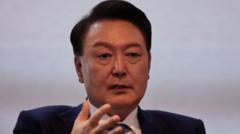The move to sideline Yoon from governmental affairs has provoked harsh criticism from opposition leaders. Democratic Party floor leader Park Chan-dae labeled the PPP's plan as an "illegal, unconstitutional second insurrection," further asserting that the announcement lacks any legitimacy. Representative Kim Min-seok echoed these sentiments, claiming that the PPP and Prime Minister have no lawful authority to wield presidential powers.
As opposition members commit to recurring impeachment votes against Yoon every Saturday, public sentiment is split. Concerned citizens express confusion about who is effectively leading the nation, despite the Ministry of National Defence reiterating that Yoon still commands the military. Political analysts warn that if Yoon chooses to return to power, he is not legally prevented from doing so, setting a potentially volatile stage for governance.
In a public address following the backlash, Yoon acknowledged the distress caused by his earlier martial law assertion, vowing never to impose such an order again. However, opposition leaders remain steadfast, vowing to restore normalcy to the nation by the end of the year and reiterating calls for Yoon’s resignation. The political landscape in South Korea is increasingly contentious, raising questions of constitutional integrity and governance amid widespread civil unrest.
As opposition members commit to recurring impeachment votes against Yoon every Saturday, public sentiment is split. Concerned citizens express confusion about who is effectively leading the nation, despite the Ministry of National Defence reiterating that Yoon still commands the military. Political analysts warn that if Yoon chooses to return to power, he is not legally prevented from doing so, setting a potentially volatile stage for governance.
In a public address following the backlash, Yoon acknowledged the distress caused by his earlier martial law assertion, vowing never to impose such an order again. However, opposition leaders remain steadfast, vowing to restore normalcy to the nation by the end of the year and reiterating calls for Yoon’s resignation. The political landscape in South Korea is increasingly contentious, raising questions of constitutional integrity and governance amid widespread civil unrest.


















